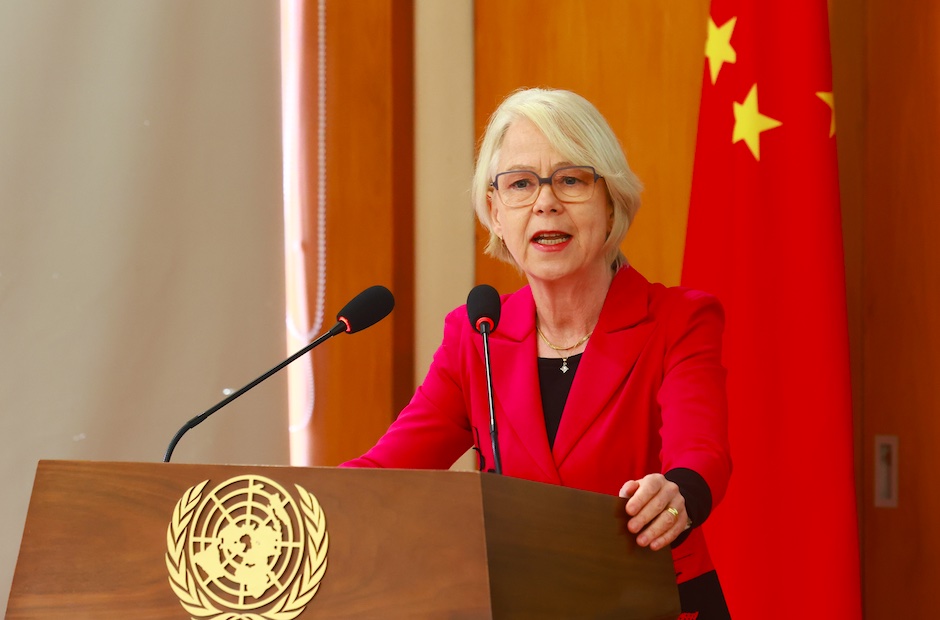Opening remarks by Ms Beate Trankmann at the 2024 Just Transition Phase 2 Launch
December 5, 2024

UNDP Resident Representative in China, Beate Trankmann, delivered opening remarks at the 2024 Just Transition Phase 2 Launch in Beijing, China.
尊敬的武巡视员,杨雷院长,同事们,朋友们,
下午好,欢迎大家参加今天的活动,一起见证我们最新关于公正转型报告的发布. (It is my great pleasure to welcome you to today’s event, marking the launch of our latest report on a just and inclusive, low-carbon transition in China.)
Following the recent conclusion of the COP29 UN Climate Conference, the urgent need to accelerate the transition to low-carbon pathways in a race against time to protect the future of both humanity and the natural world is more than abundantly clear.
But in addressing the climate emergency, it is critical to remember that the challenges facing development are often intertwined. That is why the Sustainable Development Goals (SDGs) – our global blueprint to a brighter future – are a comprehensive set of 17 interrelated goals that must be addressed collectively.
To this end, UNDP and Peking University have been jointly engaged in a two-phase research initiative. The first phase launched in 2023 focused on the employment impacts of China’s energy transition at the national level.
Building on that, the second phase, which we are launching today, takes a closer look at the varied impacts across different regions in China and the challenges they bring about.
Our phase 2 report examines Shanxi Province in particular, which is home to over 20% of China’s coal reserves and employs 37% of the total coal workforce nationwide. The report takes a deep dive into Shanxi’s case, providing a forecast for labor market changes in the province, and looks at steps being taken by the provincial government including specifically referring to a “just transition” in Shanxi’s 2024 government work report.
The report also provides targeted policy recommendations based on a review of China’s past efforts in managing labor market shocks and diversifying resource-based economies.
Some examples of these recommendations include establishing a national coordination mechanism, and channeling more resources and support to regions that are most in need, to ensure a fair and coordinated transition.
In addition, at the local level, when diversifying local economies, coal-dependent regions are advised to fully consider their comparative advantages and global sustainability trends to attract and develop replacement industries.
And lastly, to ensure adequate funding, coal-dependent regions could actively pilot transition finance standards and explore blended finance options to mobilize private capital for an inclusive transition.
"Climate action is not just about reducing emissions; it is also about ensuring that the transition to a green economy is inclusive, equitable, and leaves no one behind."
Moving forward, beyond producing evidence-based research, UNDP China is actively advising local governments, for instance, the city of Ordos in Inner Mongolia, on their low-carbon transition strategies.
To prepare the workforce for emerging green job opportunities, we are also collaborating with Foshan and Changshu on hydrogen energy talent development. These initiatives aim to equip young people with accessible, gender-responsive opportunities for employment and career growth in the green economy.
As a trusted partner and integrated solutions provider, UNDP is well equipped and keen to further collaborate with local governments on their green transition journeys, leveraging our global network and expertise to deliver impactful results.
In closing, I would like to extend my appreciation to our distinguished keynote speakers and panelists for their time and contributions. I would also like to thank our esteemed co-organizer, the Institute of Energy at Peking University, for partnering with us on this important initiative.
Lastly, I also want to recognize our UNDP colleagues from our regional bureau and country offices in India and Indonesia joining us today. Indeed, China’s experiences in ensuring a just transition are very relevant for many developing countries in the region facing similar challenges, and vice-versa. Their perspectives will enrich our discussions, offering important insights for mutual learning.
(With that, I look forward to a productive and insightful discussion. Thank you again to all, and I wish you a successful event!)
非常期待接下来大家富有成效的讨论,再次感谢大家,祝活动圆满成功!
Read the full report: go.undp.org/Jp3

 Locations
Locations



